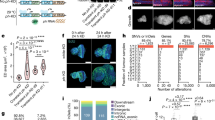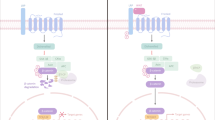Abstract
Recent studies suggest that physiological and tumorigenic proliferation of mammalian cells is controlled by multiple cyclin-dependent kinases (CDKs) largely in tissue-specific manners. We and others previously demonstrated that adult mice deficient for the Cyclin D partner CDK4 (Cdk4−/− mice) exhibit hypoplasia in the pituitary and pancreatic islet due to primary postnatal defects in proliferation. Intriguingly, those neuroendocrine tissues affected in Cdk4−/− mice are the primary targets of tumorigenesis in the syndrome of multiple endocrine neoplasia type-1 (MEN1). Mice with heterozygous disruption of the tumor suppressor Men1 gene (Men1+/−) develop tumors in the pituitary, pancreatic islets and other neuroendocrine tissues, which is analogous to humans with MEN1 mutations. To explore the genetic interactions between loss of Men1 and activation of CDKs, we examined the impact of Cdk4 or Cdk2 disruption on tumorigenesis in Men1+/− mice. A majority of Men1+/− mice with wild-type CDKs developed pituitary and islet tumors by 15 months of age. Strikingly, Men1+/−; Cdk4−/− mice did not develop any tumors, and their islets and pituitaries remained hypoplastic with decreased proliferation. In contrast, Men1+/−; Cdk2−/− mice showed pituitary and islet tumorigenesis comparable to those in Men1+/− mice. Pituitaries of Men1+/−; Cdk4−/− mice showed no signs of loss of heterozygosity (LOH) in the Men1 locus, whereas tumors in Men1+/− mice and Men1+/−; Cdk2−/− mice exhibited LOH. Consistently, CDK4 knockdown in INS-1 insulinoma cells inhibited glucose-stimulated cell cycle progression with a significant decrease in phosphorylation of retinoblastoma protein (RB) at specific sites including Ser780. CDK2 knockdown had minimum effects on RB phosphorylation and cell cycle progression. These data suggest that CDK4 is a critical downstream target of MEN1-dependent tumor suppression and is required for tumorigenic proliferation in the pituitary and pancreatic islet, whereas CDK2 is dispensable for tumorigenesis in these neuroendocrine cell types.
This is a preview of subscription content, access via your institution
Access options
Subscribe to this journal
Receive 50 print issues and online access
$259.00 per year
only $5.18 per issue
Buy this article
- Purchase on Springer Link
- Instant access to full article PDF
Prices may be subject to local taxes which are calculated during checkout





Similar content being viewed by others
References
Marx SJ . Molecular genetics of multiple endocrine neoplasia types 1 and 2. Nat Rev Cancer 2005; 5: 367–375.
Wu X, Hua X . Menin histone H3 methyltransferases, and regulation of cell proliferation: current knowledge and perspective. Curr Mol Med 2008; 8: 805–815.
Crabtree JS, Scacheri PC, Ward JM, Garrett-Beal L, Emmert-Buck MR, Edgemon KA et al. A mouse model of multiple endocrine neoplasia, type 1, develops multiple endocrine tumors. Proc Natl Acad Sci USA 2001; 98: 1118–1123.
Bertolino P, Tong WM, Galendo D, Wang ZQ, Zhang CX . Heterozygous Men1 mutant mice develop a range of endocrine tumors mimicking multiple endocrine neoplasia type 1. Mol Endocrinol 2003; 17: 1880–1892.
Harding B, Lemos MC, Reed AA, Walls GV, Jeyabalan J, Bowl MR et al. Multiple endocrine neoplasia type 1 knockout mice develop parathyroid, pancreatic, pituitary and adrenal tumours with hypercalcaemia, hypophosphataemia and hypercorticosteronaemia. Endocr Relat Cancer 2009; 16: 1313–1327.
Sherr CJ . The Pezcoller lecture: cancer cell cycles revisited. Cancer Res 2000; 60: 3689–3695.
Sherr CJ, Roberts JM . Living with or without cyclins and cyclin-dependent kinases. Genes Dev 2004; 18: 2699–2711.
Malumbres M, Barbacid M . Cell cycle kinases in cancer. Curr Opin Genet Dev 2007; 17: 60–65.
Kiyokawa H, Kineman RD, Manova-Todorova KO, Soares VC, Hoffman ES, Ono M et al. Enhanced growth of mice lacking the cyclin-dependent kinase inhibitor function of p27(Kip1). Cell 1996; 85: 721–732.
Fero ML, Rivkin M, Tasch M, Porter P, Carow CE, Firpo E et al. A syndrome of multiorgan hyperplasia with features of gigantism, tumorigenesis, and female sterility in p27(Kip1)-deficient mice. Cell 1996; 85: 733–744.
Nakayama K, Ishida N, Shirane M, Inomata A, Inoue T, Shishido N et al. Mice lacking p27(Kip1) display increased body size, multiple organ hyperplasia, retinal dysplasia, and pituitary tumors. Cell 1996; 85: 707–720.
Franklin DS, Godfrey VL, Lee H, Kovalev GI, Schoonhoven R, Chen-Kiang S et al. CDK inhibitors p18(INK4c) and p27(Kip1) mediate two separate pathways to collaboratively suppress pituitary tumorigenesis. Genes Dev 1998; 12: 2899–2911.
Franklin DS, Godfrey VL, O'Brien DA, Deng C, Xiong Y . Functional collaboration between different cyclin-dependent kinase inhibitors suppresses tumor growth with distinct tissue specificity. Mol Cell Biol 2000; 20: 6147–6158.
Tsutsui T, Hesabi B, Moons DS, Pandolfi PP, Hansel KS, Koff A et al. Targeted disruption of CDK4 delays cell cycle entry with enhanced p27(Kip1) activity. Mol Cell Biol 1999; 19: 7011–7019.
Rane SG, Dubus P, Mettus RV, Galbreath EJ, Boden G, Reddy EP et al. Loss of Cdk4 expression causes insulin-deficient diabetes and Cdk4 activation results in beta-islet cell hyperplasia. Nat Genet 1999; 22: 44–52.
Jirawatnotai S, Moons DS, Stocco CO, Franks R, Hales DB, Gibori G et al. The cyclin-dependent kinase inhibitors p27Kip1 and p21Cip1 cooperate to restrict proliferative life span in differentiating ovarian cells. J Biol Chem 2003; 278: 17021–17027.
Fatrai S, Elghazi L, Balcazar N, Cras-Meneur C, Krits I, Kiyokawa H et al. Akt induces beta-cell proliferation by regulating cyclin D1, cyclin D2, and p21 levels and cyclin-dependent kinase-4 activity. Diabetes 2006; 55: 318–325.
Berthet C, Aleem E, Coppola V, Tessarollo L, Kaldis P . Cdk2 knockout mice are viable. Curr Biol 2003; 13: 1775–1785.
Malumbres M, Sotillo R, Santamaria D, Galan J, Cerezo A, Ortega S et al. Mammalian cells cycle without the D-type cyclin-dependent kinases Cdk4 and Cdk6. Cell 2004; 118: 493–504.
Ortega S, Prieto I, Odajima J, Martin A, Dubus P, Sotillo R et al. Cyclin-dependent kinase 2 is essential for meiosis but not for mitotic cell division in mice. Nat Genet 2003; 35: 25–31.
Mettus RV, Rane SG . Characterization of the abnormal pancreatic development, reduced growth and infertility in Cdk4 mutant mice. Oncogene 2003; 22: 8413–8421.
Martin J, Hunt SL, Dubus P, Sotillo R, Nehme-Pelluard F, Magnuson MA et al. Genetic rescue of Cdk4 null mice restores pancreatic beta-cell proliferation but not homeostatic cell number. Oncogene 2003; 22: 5261–5269.
Jirawatnotai S, Aziyu A, Osmundson EC, Moons DS, Zou X, Kineman RD et al. Cdk4 is indispensable for postnatal proliferation of the anterior pituitary. J Biol Chem 2004; 279: 51100–51106.
Akerblom B, Anneren C, Welsh M . A role of FRK in regulation of embryonal pancreatic beta cell formation. Mol Cell Endocrinol 2007; 270: 73–78.
Agudo J, Ayuso E, Jimenez V, Salavert A, Casellas A, Tafuro S et al. IGF-I mediates regeneration of endocrine pancreas by increasing beta cell replication through cell cycle protein modulation in mice. Diabetologia 2008; 51: 1862–1872.
Pannett AA, Thakker RV . Somatic mutations in MEN type 1 tumors, consistent with the Knudson ‘two-hit’ hypothesis. J Clin Endocrinol Metab 2001; 86: 4371–4374.
Sayo Y, Murao K, Imachi H, Cao WM, Sato M, Dobashi H et al. The multiple endocrine neoplasia type 1 gene product, menin, inhibits insulin production in rat insulinoma cells. Endocrinology 2002; 143: 2437–2440.
Bazzi W, Renon M, Vercherat C, Hamze Z, Lacheretz-Bernigaud A, Wang H et al. MEN1 missense mutations impair sensitization to apoptosis induced by wild-type menin in endocrine pancreatic tumor cells. Gastroenterology 2008; 135: 1698–1709.
Zuo L, Weger J, Yang Q, Goldstein AM, Tucker MA, Walker GJ et al. Germline mutations in the p16INK4a binding domain of CDK4 in familial melanoma. Nat Genet 1996; 12: 97–99.
Soufir N, Avril MF, Chompret A, Demenais F, Bombled J, Spatz A et al. Prevalence of p16 and CDK4 germline mutations in 48 melanoma-prone families in France. The French Familial Melanoma Study Group. Hum Mol Genet 1998; 7: 209–216.
Molven A, Grimstvedt MB, Steine SJ, Harland M, Avril MF, Hayward NK et al. A large Norwegian family with inherited malignant melanoma, multiple atypical nevi, and CDK4 mutation. Genes Chromosomes Cancer 2005; 44: 10–18.
Milne TA, Hughes CM, Lloyd R, Yang Z, Rozenblatt-Rosen O, Dou Y et al. Menin and MLL cooperatively regulate expression of cyclin-dependent kinase inhibitors. Proc Natl Acad Sci USA 2005; 102: 749–754.
Karnik SK, Hughes CM, Gu X, Rozenblatt-Rosen O, McLean GW, Xiong Y et al. Menin regulates pancreatic islet growth by promoting histone methylation and expression of genes encoding p27Kip1 and p18INK4c. Proc Natl Acad Sci USA 2005; 102: 14659–14664.
Mould AW, Duncan R, Serewko-Auret M, Loffler KA, Biondi C, Gartside M et al. Global expression profiling of murine MEN1-associated tumors reveals a regulatory role for menin in transcription, cell cycle and chromatin remodelling. Int J Cancer 2007; 121: 776–783.
Dor Y, Brown J, Martinez OI, Melton DA . Adult pancreatic beta-cells are formed by self-duplication rather than stem-cell differentiation. Nature 2004; 429: 41–46.
Karnik SK, Chen H, McLean GW, Heit JJ, Gu X, Zhang AY et al. Menin controls growth of pancreatic beta-cells in pregnant mice and promotes gestational diabetes mellitus. Science 2007; 318: 806–809.
Pei XH, Bai F, Tsutsui T, Kiyokawa H, Xiong Y . Genetic evidence for functional dependency of p18Ink4c on Cdk4. Mol Cell Biol 2004; 24: 6653–6664.
Fiaschi-Taesch N, Bigatel TA, Sicari B, Takane KK, Salim F, Velazquez-Garcia S et al. Survey of the human pancreatic beta-cell G1/S proteome reveals a potential therapeutic role for cdk-6 and cyclin D1 in enhancing human beta-cell replication and function in vivo. Diabetes 2009; 58: 882–893.
Tang LH, Contractor T, Clausen R, Klimstra DS, Du YC, Allen PJ et al. Attenuation of the retinoblastoma pathway in pancreatic neuroendocrine tumors due to increased cdk4/cdk6. Clin Cancer Res 2012; 18: 4612–4620.
Aleem E, Kiyokawa H, Kaldis P . Cdc2-cyclin E complexes regulate the G1/S phase transition. Nat Cell Biol 2005; 7: 831–836.
Yu Q, Sicinska E, Geng Y, Ahnstrom M, Zagozdzon A, Kong Y et al. Requirement for CDK4 kinase function in breast cancer. Cancer Cell 2006; 9: 23–32.
Ray D, Terao Y, Christov K, Kaldis P, Kiyokawa H . Cdk2-null mice are resistant to ErbB-2-induced mammary tumorigenesis. Neoplasia 2011; 13: 439–444.
Berthet C, Klarmann KD, Hilton MB, Suh HC, Keller JR, Kiyokawa H et al. Combined loss of Cdk2 and Cdk4 results in embryonic lethality and Rb hypophosphorylation. Dev Cell 2006; 10: 563–573.
Harbour JW, Luo RX, Dei Santi A, Postigo AA, Dean DC . Cdk phosphorylation triggers sequential intramolecular interactions that progressively block Rb functions as cells move through G1. Cell 1999; 98: 859–869.
Ray D, Terao Y, Fuhrken PG, Ma ZQ, DeMayo FJ, Christov K et al. Deregulated CDC25A expression promotes mammary tumorigenesis with genomic instability. Cancer Res 2007; 67: 984–991.
Acknowledgements
This paper is dedicated in fond memory to Patricia Lorenzo, a former member of the Molecular Oncogenesis NCI study section and the University of Hawaii Cancer Center, who brightened deliberations with her compassion, affability and dedication. Her remarkable courage in the face of terminal cancer has been inspirational. We thank William Lowe Jr, Alfred Rademaker, Evan Osmundson, Finola Moore and Yiran Zhou for their scientific advice, and Thomas O’Grady, Brian Zwecker, Alba Santana and Suchitra Prasad for their excellent technical assistance. This work was supported by funds from the National Institutes of Health (R01-HD38085, CA100204, and CA112282 to HK and DK066044 to MPG), Lynn Sage Cancer Research Foundation, Phi Beta Psi Sorority, Searle Leadership Fund, Zell Fund, H. Foundation, the Director Fund of Robert H. Lurie Comprehensive Cancer Center and the Department of Molecular Pharmacology and Biological Chemistry.
Author information
Authors and Affiliations
Corresponding authors
Ethics declarations
Competing interests
The authors declare no conflict of interest.
Rights and permissions
About this article
Cite this article
Gillam, M., Nimbalkar, D., Sun, L. et al. MEN1 tumorigenesis in the pituitary and pancreatic islet requires Cdk4 but not Cdk2. Oncogene 34, 932–938 (2015). https://doi.org/10.1038/onc.2014.3
Received:
Revised:
Accepted:
Published:
Issue Date:
DOI: https://doi.org/10.1038/onc.2014.3
Keywords
This article is cited by
-
Non-canonical roles of PFKFB3 in regulation of cell cycle through binding to CDK4
Oncogene (2018)
-
Cell cycle proteins as promising targets in cancer therapy
Nature Reviews Cancer (2017)
-
RETRACTED ARTICLE: CDK4 and miR-15a comprise an abnormal automodulatory feedback loop stimulating the pathogenesis and inducing chemotherapy resistance in nasopharyngeal carcinoma
BMC Cancer (2016)



